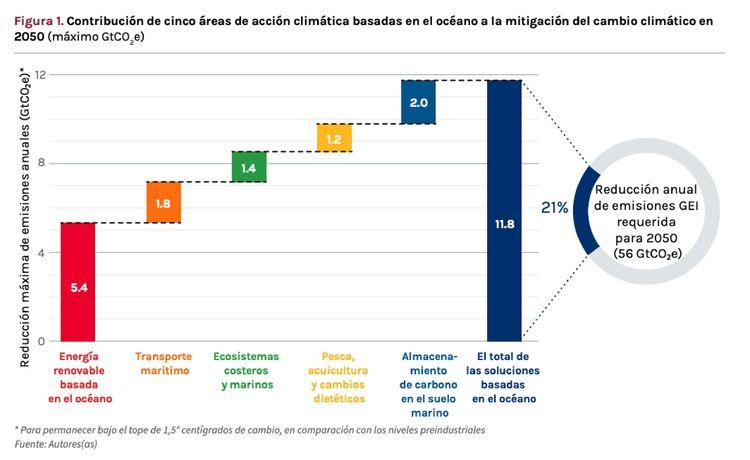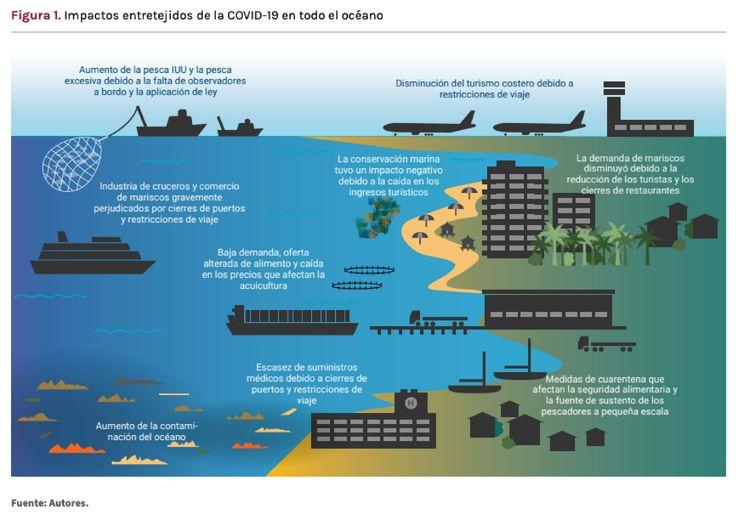The ocean became soldier and cannon fodder at the same time. It is at the forefront of the fight against climate change and could reduce up to a fifth of greenhouse gases over the next 30 years. But it also faces overexploitation, loss of species, pollution, acidification and more impacts of human activity.
“What allows us to survive on this planet is the ocean. It's the common base of each country's economy,” Elva Escobar Briones, a researcher at the Institute of Marine Sciences and Limnology of the National Autonomous University of Mexico (UNAM), explains in an interview.
Since 2018, Escobar has been part of the science team of the High Level Panel for a Sustainable Ocean Economy (Ocean Panel), an initiative in which 14 world leaders participate to discuss actions for the conservation of the oceans in relation to the world, of which Mexico has been a part since December 2020.
“A lot of people still have the narrative that the ocean is big enough and we can discard anything we want. Today, that narrative has changed. The sea is too big to pay for the costs of cleaning it, it's too big not to take into account,” said researcher Escobar.
But how big is the ocean and how important is its conservation? So large and important that it occupies 71% of our planet. “We are more water than land,” says the oceanographer.
This immensity of the seas is what absorbs up to 30% of carbon dioxide (CO2) emissions. This reduces the impacts of global warming.
In fact, a healthy ocean could reduce up to 21% per year, that is, up to a fifth of the greenhouse gases (GHG emissions) that the world requires by 2050 in the battle against climate change, according to information from the Ocean Panel.
This is why it is considered that saving the oceans is a significant step in the face of pollution, the greenhouse effect, global warming and the unsustainable use of natural resources.
“So for this (saving the oceans) what is required? It's one of the questions we immediately have in all sectors, well... Political will is required. Investment is required. The involvement of the private sector is required. New public funding bodies are required. Training and training of technical and scientific cadres are required for the different areas,” said the researcher.

Areas of action in the ocean proposed to achieve a 21% reduction in GHG emissions. Source: “The ocean as a solution to climate change” from the Ocean Panel.
Costs, Debts, and Gambling
The seas, like anywhere in the world, could not avoid the coronavirus pandemic that began in December 2019.
The document “A sustainable and equitable blue recovery from the Covid-19 crisis”, referenced by researcher Elva Escobar in the Ocean Panel, divides the impacts on various ocean sectors into positive, negative and neutral: coastal and marine tourism, marine transport, capture fisheries, aquaculture, renewable energy and marine conservation.
Women, informal workers, members of indigenous communities and young people are also mentioned as the populations most affected in the ocean economy after the pandemic.
“For our country, a sustainable ocean economy is necessary to achieve a higher objective: the general well-being of the population. Promoting this goal means, first of all, prioritizing local communities, ensuring that the ocean continues to be a source of well-being for everyone,” the Secretary of Foreign Affairs said in a statement on December 3 when she announced the addition of Mexico to the Ocean Panel.
As mentioned in the letter, the big bet is the sustainable ocean economy. This is focusing on actions to prioritize ocean health while maintaining equitable production that benefits the human population and helps species.
And researcher Elva Escobar, together with dozens of other specialists, is working to identify those actions and those areas of opportunity to fulfill this commitment.
“We can invest in restoration and that will generate sources of work; in cultivation activities, particularly algae, that allow us to be sustainable in food; encourage the maritime transport we have to change to zero-emission, decarbonized transport...”, the researcher listed.
“The sea is here, in front of us. We give it little interest because perhaps it is far from our activity centers in large cities. At a cultural level, we see it as a mechanism for relaxing on vacation or a source of food as an additional protein, but it supports perhaps the most important economy in the country within the framework of many activities,” he added.

Areas of action in the ocean proposed to achieve a 21% reduction in GHG emissions. Source: “The ocean as a solution to climate change” from the Ocean Panel.
The list of solutions
In Mexico, a budget for scientific research is less than 1% of Gross Domestic Product (GDP).
This percentage falls short of international scales, which suggest at least 7%, according to the Consortium of Marine Research Institutions of the Gulf of Mexico and the Caribbean (CIIMAR-GOMC).
“Mexico is suffering from continuous changes in the federal public administration that do not match the need for a Mexican State policy for the development and conservation of the nation's seas and coasts [...] Among the most important challenges is the scarcity of economic resources to carry out cutting-edge scientific research,” CIIMAR points out in the report.
Despite the scenario, there are constant initiatives, research and recommendations carried out by the scientific community specialized in the ocean and environmental sectors.
For example, the Ocean Panel's own documents include a repertoire of actions such as the restoration and protection of coastal and marine ecosystems; investing in sewage and wastewater infrastructure for coastal communities; encouraging zero-emission shipping and renewable energy.
But in the midst of proposals and decision-making, researcher Escobar recognizes one more factor: the will of the different sectors involved.
“Work is required in political, research and technology, involving government, education and industry. Because they are necessary to be able to achieve that sustainable and equitable recovery that can help us in the face of the Covid-19 crisis,” he concluded.



Comentarios (0)